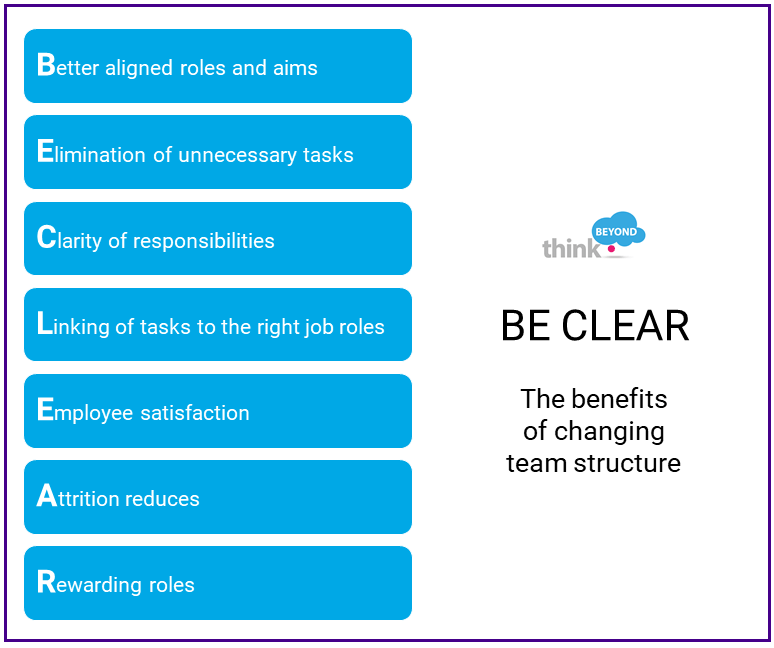At the time of writing, there were 1.1 million job vacancies in the three months to September 2021. Whilst some of these jobs could be considered fairly straightforward roles in leisure and hospitality, others are not. Particularly in knowledge worker roles, these roles seem to have become ever more complex. Some are calling this ‘The Great Resignation’ while others are extolling the virtues of ‘The Great Engagement’ to improve Employee Experience (EX). Read on to find out why we should change team structure and have the courage to create better EX.
Changing team structure and why it is important
How many roles in the corporate world can be described as clear, easy and one-dimensional? Unless the role is incredibly process-oriented and driven by volume, most roles have a range of responsibilities. For example, an operational manager may be responsible for production, storage, distribution before we talk about management, reporting, quality control, regulatory requirements, training and more. A marketing manager may be hired to manage a brand but has to manage a team, report on success, liaise with third parties, create campaigns, update packaging, conduct market research, create content and adhere to advertising standards, GDPR and FCA rules.
In all cases, some of these roles sound rather complicated and they are. It also isn’t unusual to find things in job descriptions that don’t seem like they relate to the role or should not be your responsibility. Furthermore, job descriptions are getting longer and more detailed when you apply for jobs and those in jobs are lucky if theirs is up-to-date.
This is important because it may be part of the reason that firms are unable to fill vacancies – the roles are simply unattractive and the ‘perfect’ candidate doesn’t exist. Many companies seek to maximise productivity by combining several elements into a single role, which we argue undermines long-term EX.
The courage to change comes from leadership
If change means to do something different or to do what you are doing in a different way, then why do so many job roles appear to be a ‘Frankenstein’ of different responsibilities? Roles may have grown organically as the organisation has changed or grown in complexity around the incumbents. When staff depart the organisation, managers often move quickly to fill the space left behind. It is at this point that they have an opportunity to revisit the job description and what it should look like. Whilst some managers lack the time or try to hide the less attractive aspects of the role, others relish the idea of passing on part of their own responsibility to the new starter.
Unfortunately, it requires courage to change a team and the job roles within it and this can only come from leadership. Since we know that 68% of people become ‘accidental leaders’ and have no formal training, it makes sense that it becomes a ‘tick box’ exercise for many. Additionally, some leaders are adept at motivating or coaching during the tough times. However, if this is all the time because of the workload in a complex job role, it loses its effect and people look at other options. These leaders may lack the courage and/or the skills to transform the team and the roles within it.
Creating better jobs for EX
One aspect of leadership that came up repeatedly in our recent podcast on leadership styles was clarity. This refers to clarity of aims, clarity of communications and clarity of responsibilities. If the aims of the organisation are too abstract to an individual or their personal objectives don’t follow SMART (Specific, Measurable, Achievable, Realistic and Time Bound), the purpose and goal they are working towards is unclear. If the communication of the aims and tasks to complete isn’t clear, concise and unambiguous, then an individual may not act on them or not realise the importance. Finally, if your responsibilities are varied, vast and undocumented, the context in which leadership operates is compromised. This often explains why more established staff members seem reticent when a new aim is announced. As a result, leaders look for other people to stand up those tasks to support it.
In order to create better job roles and support EX, it is necessary to review the processes that go on within a team. Armed with a thorough understanding of what people do, how long it takes and where value is added, changes can be made. This is often a level deeper than HR will go and far removed from EAPs (Employee Assistance Programmes). Any such change takes time and focus away from delivering activities but there are many benefits to be had.
Benefits of changing team structure (BE CLEAR)
The benefits of changing team structure (BE CLEAR) are as follows:
- Better aligned roles and aims
- Elimination of unnecessary tasks
- Clarity of responsibilities
- Linking of tasks to the right job roles
- Employee satisfaction
- Attrition reduces
- Rewarding roles

A change such as this requires the courage to communicate the aim and the benefits and to win hearts and minds. Once through the shock and denial that roles will change, we can manage our internal and external stakeholders. One sign of an unhappy team is poor employee survey results (if staff trust in the anonymity of the survey). Others include insubordinate behaviour, low morale, staff attrition or unreasonable demands for pay awards.
Support your teams with change
Here at Think Beyond, we offer a range of change services to support your business change and transformation programmes. We passionately believe that every worker deserves a job that they can enjoy doing. We also know that the challenge of filling job vacancies is partly within our gift to solve.
If you would like to discuss your team structure or to embark on change, simply email us at sales@think-beyond.co.uk. Alternatively, why not call us on 01565 632206 or add a few details online and we will call you.
Finally, why not check out a related article written specifically for marketers.

